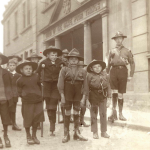Here are some initial findings from a first day of research at the Wellcome Library, which holds records from the period when Chiswick House was an asylum:
It is still early days in our attempts to decipher the subtle peaks and troughs of doctors’ handwriting in the large leather-bound case books from Chiswick House Asylum. However, the details they have yielded have already proven fascinating in tracing the journey of a Northern Irish landowner named Francis Peter Gervais.
Born just five years after the Potato Famine drew to a close, he was supportive of Ulster unionists. In 1877 he was appointed a Lieutenant in the Mid Ulster Artillery.
Gervais was admitted to Chiswick House Asylum on June 15, 1898, with the doctor referring his case after consult apparently not fully convinced that he hadn’t been feigning his ‘mental aberration’. However, this could also have been a testament to its severity.
“…Although there is no doubt in my own mind of mental aberration…his conduct was of such a nature that it might be put down to his intentionally acting a part,” a note addressed only to ‘Madam’ stated on the day of his admittance.
While, in an official capacity, his case notes state that he was a barrister at law, married with a child, there is an out-of-place and difficult to contextualize scribble seeming to refer to Shakespeare early on in his stay.
A record held in the National Archives, dated two years before Gervais’ death in 1918, lets us know that he lived through World War I – an interesting period in itself with regards to changing perceptions of mental illness.
Further research shows that he authored a poorly-received (at least, according to him) book titled Shakespeare Not Bacon; Some Arguments from Shakespeare’s Copy of Florio’s Montaigne in the British Museum which was published shortly after his release. As the title suggests, Gervais was not convinced by the arguments of those who had questioned the authenticity of Shakespeare’s plays.
In a letter to one Edward Dowden, dated December 16 1901, the record of which is available online, he expressed concern about the lack of press recognition his book had received. It seems that he was not entirely fair on himself; it did indeed receive a review in The Spectator, on May 18, 1901 – however, its author did not fully agree with Gervais’ assessment, noting that Shakespeare had seemed to encounter difficulties signing his own name and thus would have faced problems producing the body of work that he did.
A record held in the National Archives, dated two years before Gervais’ death in 1918, lets us know that he lived through World War I – an interesting period in itself with regards to changing perceptions of mental illness. Its title states that he suspected a local clergyman by the name of Reverend Thomas Stothers of being a German agent. I will most definitely be chasing this record up to learn more about the nature of his fears.
So, while the details of his life have emerged in a piecemeal fashion, and his ‘physical health’ appeared to be ‘sound’, his mental health status (in the eyes of his assessor) for the duration of his months-long stay is yet to be deciphered. That said, it has already been possible to glean great insight into his life with the aid of minimal prompts – and he is just the first patient. Wish us luck!










